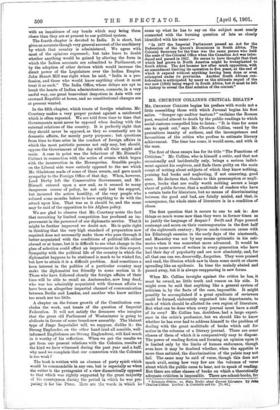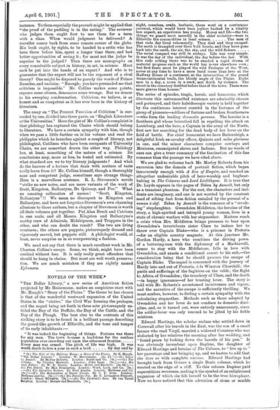MR. CHURTON COLLINS'S CRITICAL ESSAYS.* MR. OM:TETON COLLINS begins his
preface with words not a little resembling those with which Juvenal begins his first satire. " &raper ego auditor tantum ?" exclaims the Roman poet, wearied almost to death by the public readings to which social customs compelled him to listen: "It is time for some one to speak out," says Mr. Churton Co] lins, vexed by the pretentious inanity of authors, and the incompetence and favouritism of the critics who profess to estimate literary achievement. The time has come, it would seem, and with it the man.
The first of these essays has for its title "The Functions of Criticism." Mr. Collins, who is himself a critic, and that not occasionally and incidentally only, brings a serious indict- ment against his confreres, and finds them guilty on the main count of writing about subjects of which they know nothing, praising bad books and neglecting, if not censuring, good ones. He declares that, thanks to this presumption or negli- gence, books that are really worth nothing secure a large share of public favour, that a multitude of readers who have a certain taste for literature, but no means of discriminating between the good and bad, are fatally misled, and that, in consequence, the whole state of literature is in a condition of chaos.
The first question that it occurs to one to ask is : Are things so much worse now than they were in former times as to justify the language of despair ? Swift and Pope poured contempt and scorn on their contemporaries in the first half of the eighteenth century ; Byron made common cause with his Edinburgh enemies in the early days of the nineteenth, and Macaulay was not by any means optimistic in his esti- mates when it was somewhat more advanced. It would be easy to name scores of writers in every generation who have had their day of popularity and are now absolutely, and, for all that one can see, deservedly, forgotten. They were praised and read, the illusion which saw in them some merit or charm spreading like an epidemic. In time the malady abated and passed away, but it is always reappearing in new forms.
When Mr. Collins inveighs against the critics he has, it must be owned, no little truth and reason on his side. It might even be said that anything like a general system of criticism is, by the facts of the case, impossible. It might possibly be accomplished if a great syndicate of reviewers could be formed, elaborately organised into departments, to each of which should be allotted its own region of literature. But what can be done when every journal must have a staff of its own ? Mr. Collins has, doubtless, had a large experi- ence in the critic's professior, but we should like to know whether he has ever had to address himself to the problem of dealing with the great multitude of books which call for notice in the columns of a literary journal. There are some classes of them of which it is comparatively easy to dispose. The power of reading fiction and forming an opinion upon it is limited only by the limits of human endurance, though even here it may be doubted whether, when the appetite is more than satiated, the discrimination of the palate may not fail. The same may be said of verse, though this does not much avail, seeing how very few are the volumes of verse about which the public cares to hear, not to speak of reading. But there are other °lasses of books on which a theoretically adequate criticism is impossible. There are school-books, for
• Ephemera Critica ; or, Plain Truths about Current Literature. Ej jOblik Clnuton Colhun. Loudon : A. Constable and Co. [7s. 6d.]
instauce. To them especially the proverb might be applied that "the proof of the pudding is in the eating." - The reviewer who judges them ought first to use them for a term with a class. When would judgment - be delivered P A traveller comes back from some remote corner of the globe. His book ought, by rights, to be handed to a-critic who has been there before him, spent a longer time there, and had better opportunities of seeing it; for must not the judge be superior to the judged ? Then there are monographs on every conceivable subject in history, in art, in science. Must each be put into the hands of an expert? And who is to guarantee that the expert will not be the exponent of a rival theory? One might be disposed to parody the words of Prince Rasselas, and exclaim: "Enough; you have persuaded me that criticism is impossible." Mr. Collins makes some points, exposes some abuses, denounces some wrongs. But we demur to his sweeping condemnation. Criticism, we believe, is as honest and as competent as it has ever been in the history of literature.
The essay on "The Present Function. of Criticism" is suc- ceeded by one, divided into three parts, on "English Literature at the Universities." Here the gist of Mr. Collins's complaint is that philology has captured the Chairs which should belong to literature. We have a certain sympathy with him, though when we pass a little further on in his volume and read the philippics which be launches against a couple of literary, not Catilines who have been occupants of University Chairs, we are somewhat drawn the other way. Philology has, at least, something of the nature of a science. Its conclusions may, more or less, be tested and estimated. By what standard are we to try literary judgments ? And what do the hearers of a lecture that deals with matters of taste really learn from it? Mr. Collins himself, though a thoroughly sane and competent judge, sometimes says strange things. Here is a marvellous sentence. R. L. Stevenson's novels "strike no new notes, and are mere variants of the work of Scott, Kingston, Ballantyne, De Quincey, and Poe." What an amazing collocation of names ! "Scott, Kingston, Ballantyne" I! We mean no disrespect to Kingston and Ballantyne, and have not forgotten Stevenson's own charming allusions to those authors, but a chapter of Stevenson is worth all their volumes put together. Put Alan Breck and Catriona in one scale, and all Messrs. Kingston and Ballantyne's motley crew of Admirals, Midshipmen, and Trappers in the other, and who can doubt the result? The two are living creatures; the others are puppets, picturesquely dressed and vigorously moved, but puppets still. A philologist would, at least, never surprise us in so overpowering a fashion.
We need not say that there is much excellent work in Mr. Churton Collins's essays. Some, we think, might have been omitted without loss. It is only really great offenders that should be hung in chains. But most are well worth preserva- tion. We are much mistaken if they are rightly named Ephemera.







































 Previous page
Previous page